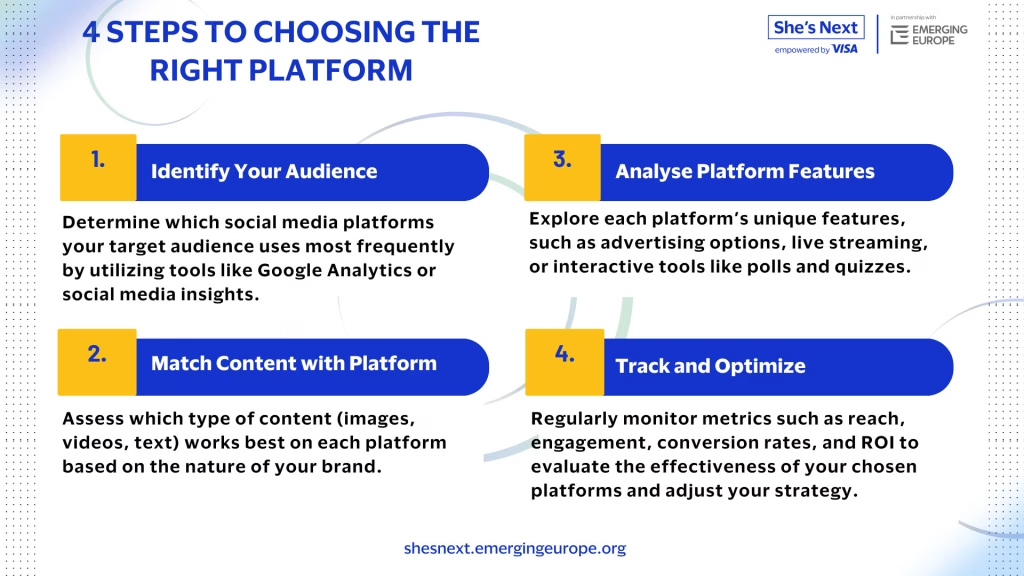
Selecting the Ideal Social Media Platforms for Your Business Goals
Navigating the digital landscape is a must for modern businesses, and social media platforms are at the heart of this terrain. With their ability to connect you with vast audiences and engage them in unique ways, these tools are invaluable.
The challenge lies in choosing the right platforms that align with your business goals and resonate with your target audience.
Understanding Popular Social Media Platforms
Facebook: Broaden your reach with Facebook’s diverse user base. Use targeted ads to pinpoint your ideal customer and foster a community around your brand through groups and pages.
Instagram: Capitalise on visual storytelling with Instagram’s image and video-focused format. Showcase your products, share behind-the-scenes content, and use Instagram Stories for time-sensitive promotions.
Twitter: Engage in the moment with Twitter’s real-time feed. Share industry news, quick updates, and start conversations with hashtags to establish thought leadership.
LinkedIn: Build professional networks on LinkedIn. Share insightful articles, participate in industry discussions, and use LinkedIn Ads for targeted B2B lead generation.
Pinterest: Drive inspiration and sales with Pinterest’s visual discovery platform. Create themed boards, use rich pins for detailed product information, and tap into a predominantly female audience ready to shop.
TikTok: Connect with Gen Z and millennials on TikTok by creating short, engaging videos. Leverage trending challenges and sounds to go viral and increase brand visibility.
YouTube: Tell your brand’s story with YouTube’s long-form video content. Create how-to guides, product reviews, and educational content to build trust and authority in your niche.
Aligning Platforms with Specific Business Goals
Brand Awareness: Utilise visually rich platforms like Instagram and TikTok to capture attention and grow your brand’s presence.
Lead Generation: Turn to LinkedIn and Twitter to connect with professionals and gather leads through networking and insightful content.
Customer Engagement: Foster a loyal community on Facebook and Instagram by encouraging user interaction through comments, shares, and direct messaging.
Sales Conversions: Leverage Pinterest’s shopping features and Instagram’s shoppable posts to turn browsers into buyers.

Platform Selection Criteria
Selecting the right social media platform for your small business is a nuanced decision that hinges on several factors:
Demographics: It’s essential to align your target audience with the user base of the social media platform. For instance, if you’re running a trendy fashion boutique targeting millennials and Gen Z, Instagram and TikTok are prime choices due to their younger user base. Conversely, a consultancy firm aiming at professionals might find more value in LinkedIn.
Content Formats: The nature of your content should dictate your platform choice. A bakery or restaurant could leverage Instagram’s image-centric format to showcase mouth-watering photos, while a local news outlet might prefer Twitter for disseminating breaking news and updates. YouTube is ideal for businesses like fitness studios or DIY craft shops that can benefit from longer-form video content.
Advertising Options: Each platform offers unique advertising capabilities. Facebook’s advanced targeting features are excellent for local businesses such as a family-owned hardware store looking to reach homeowners in the area. Meanwhile, a niche e-commerce brand selling eco-friendly products might use Pinterest’s promoted pins to tap into an audience interested in sustainability.
Engagement Metrics: Pay close attention to engagement metrics to understand where your content strikes a chord. A tech startup sharing innovative ideas might see high engagement through thought leadership articles on LinkedIn, whereas a pet grooming service could gain traction on Facebook with cute pet makeovers encouraging likes, comments, and shares from pet lovers.
In summary, a well-crafted social media strategy considers the unique strengths and audience of each platform. Align these with your business type and goals to choose the most effective platforms for your brand.
Whether it’s Instagram’s visual appeal for lifestyle brands, Twitter’s immediacy for news and customer service, LinkedIn’s professional network for B2B relationships, or Pinterest’s discovery potential for retail, there’s a platform tailored to every business need.
Tips for Platform Selection
As an entrepreneur, start by identifying the platforms where your target audience is most active. Don’t spread yourself too thin; it’s better to manage a few platforms well than many poorly.
Focus on platforms where your target audience is most active to maximize engagement.
Test different content types to discover what drives the most interaction and aligns with your brand voice.
Stay ahead by considering both current trends and the potential future relevance of each platform to your industry.
Regularly review performance data to ensure your chosen platforms are delivering the desired results.
Adapting Strategies and Monitoring Performance
Regularly review social media platform trends and user behavior to stay informed about changes in popularity and engagement patterns.
Utilise built-in analytics tools provided by social media platforms to track key performance indicators such as reach, engagement rates, and conversions.
Analyse the data collected from analytics tools to identify areas for improvement and optimisation in your social media marketing strategy.
Be prepared to pivot your social media strategy based on the insights gathered from analytics to ensure maximum return on investment (ROI).
Continuously monitor and adjust your tactics to align with the evolving landscape of social media marketing.
For female entrepreneurs, the strategic selection of social media platforms is key to achieving business success.
By understanding the nuances of each platform and aligning them with your business objectives, you can harness the power of social media to forge meaningful connections with your audience and drive measurable outcomes.
Embrace a mindset of quality over quantity, remain adaptable, and consistently evaluate your return on investment to master the art of social media marketing.
New Free Courses — Made for Ambitious Women Entrepreneurs!
It’s time to grow smarter, adapt faster, and take your business global.
Explore two powerful courses available exclusively to She’s Next members:
The Reinvention Masterclass for Start-up Founders
Beyond Borders: Building for Global Success
Enroll today — it’s free!






Responses